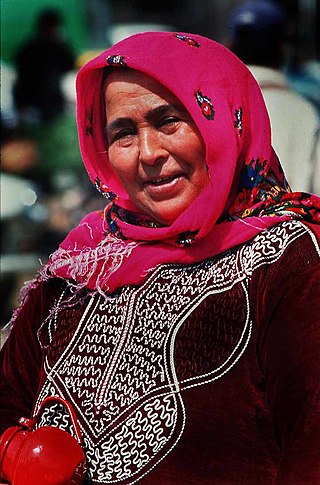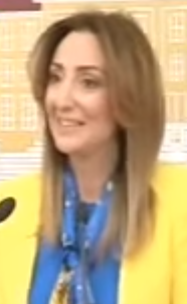
In modern usage, hijab generally refers to variety of head coverings conventionally worn by many Muslim women as an expression of faith. Similar to the tichel or snood worn by Orthodox Jewish women, certain headcoverings worn by some Christian women, such as the mantilla, apostolnik and wimple, and the dupatta favored by many Hindu and Sikh women, the hijab comes in various forms. Often, it specifically describes a scarf that is wrapped around the head, covering the hair, neck, and ears while leaving the face visible. The use of the hijab has grown globally since the 1970s, with many Muslims viewing it as a symbol of modesty and faith; it is also worn as a form of adornment. There is consensus among Islamic religious scholars that covering the head is either required or preferred. In practice, most Muslim women choose to wear it.

Islamic clothing is clothing that is interpreted as being in accordance with the teachings of Islam. Muslims wear a wide variety of clothing, which is influenced not only by religious considerations, but also by practical, cultural, social, and political factors. In modern times, some Muslims have adopted clothing based on Western traditions, while others wear modern forms of traditional Muslim dress, which over the centuries has typically included long, flowing garments. Besides its practical advantages in the climate of the Middle East, loose-fitting clothing is also generally regarded as conforming to Islamic teachings, which stipulate that body areas which are sexual in nature must be hidden from public view. Traditional dress for Muslim men has typically covered at least the head and the area between the waist and the knees, while women's islamic dress is to conceal the hair and the body from the ankles to the neck. Some Muslim women also cover their face. However, other Muslims believe that the Quran strictly mandate that women need to wear a hijab or a burqa.

Virtue Party was an Islamist political party established on 17 December 1997 in Turkey. It was found unconstitutional by the Constitutional Court and then banned on 22 June 2001 for violating the secularist articles of the Constitution. After the party's ban, the party MPs founded two sections of parties: reformist Justice and Development Party (AKP), headed by Recep Tayyip Erdoğan, and traditionalist Felicity Party (SP), headed by Recai Kutan.
Ertuğrul Özkök is a Turkish journalist and a daily columnist. Between 1990 and 2010, he was the editor-in-chief for Hürriyet, a daily newspaper published in Turkish in Turkey and some European countries. Özkök is known for advocating modernization of Turkey, globalization, women's rights and Turkey's European Union accession. He is also known for his strong relationships with Turkey's and Europe's top politicians, journalists and business people.

In France, there is an ongoing social, political, and legal debate concerning the wearing of the hijab and other forms of Islamic coverings in public. The cultural framework of the controversy can be traced to France's history of colonization in North Africa, but escalated into a significant public debate in 1989 when three girls were suspended from school for refusing to remove their headscarves. That incident, referred to in France as l'affaire du foulard or l'affaire du voile, initially focused the controversy on the wearing of the hijab in French public schools. Because of the wide-ranging social debates caused by the controversy, l'affaire du foulard has been compared to the Dreyfus affair in its impact on French culture.

The tudong is a style of headscarf, worn as interpretation of the Islamic hijab, prevalent amongst many Muslim women in the Malay-speaking world; Indonesia, Brunei, Malaysia, and Singapore. Today, the tudong forms part of the standard dress code for many offices in Indonesia and Malaysia, as well as in school uniforms and formal occasions. Though initially considered a conservative form of dress, it is worn today by most moderate Muslim women in Malaysia and Indonesia.

The 1997 military memorandum in Turkey refers to a memorandum, in which decisions issued by the Turkish military leadership on a National Security Council meeting on 28 February 1997 resulted in the resignation of Islamist prime minister Necmettin Erbakan of the Welfare Party, and the end of his coalition government.
Hijab and burka controversies in Europe revolve around the variety of headdresses worn by Muslim women, which have become prominent symbols of the presence of Islam in especially Western Europe. In several countries, the adherence to hijab has led to political controversies and proposals for a legal partial or full ban in some or all circumstances. Some countries already have laws banning the wearing of masks in public, which can be applied to veils that conceal the face. Other countries are debating similar legislation, or have more limited prohibitions. Some of them apply only to face-covering clothing such as the burqa, boushiya, or niqab; some apply to any clothing with an Islamic religious symbolism such as the khimar, a type of headscarf. The issue has different names in different countries, and "the veil" or hijab may be used as general terms for the debate, representing more than just the veil itself, or the concept of modesty embodied in Hijab.

In Turkey, secularism or laicism was first introduced with the 1928 amendment of the Constitution of 1924, which removed the provision declaring that the "Religion of the State is Islam", and with the later reforms of Turkey's first president Mustafa Kemal Atatürk, which set the administrative and political requirements to create a modern, democratic, secular state, aligned with Kemalism.

The headscarf controversy in Turkey was a 20th and early 21st century controversy about women wearing Islamic headscarves. The Republic of Turkey had been a secular state since the constitutional amendment of 1937. Mustafa Kemal Atatürk introduced the secularization of the state in the Turkish Constitution of 1924, alongside his reforms. Over 90% of Turkey's population is Muslim, and the suppression of hijab/headscarves and other prominent religious symbols in government institutions and public schools, led to heated controversy at times in Turkey. Specifically, it resulted in a clash between those favoring the secular principles of the state, such as the Turkish Armed Forces, and religious conservatives, including Islamists. In the early 21st century, the Justice and Development Party (AKP) and its leader Recep Tayyip Erdoğan reversed this, and worked to "raise a pious generation" in Turkey.

Various styles of head coverings, most notably the khimar, hijab, chador, niqab, paranja, yashmak, tudong, shayla, safseri, carşaf, haik, dupatta, boshiya and burqa, are worn by Muslim women around the world, where the practice varies from mandatory to optional or restricted in different majority Muslim and non-Muslim countries.

Aylin Nazlıaka is a Turkish politician and businesswoman from the Republican People's Party.

Şafak Pavey is a Turkish diplomat, columnist and politician. She was a member of the Turkish Grand National Assembly from the main opposition Republican People's Party (CHP) representing Istanbul Province. She is the first disabled woman ever elected to the Turkish parliament, and is a member of the United Nations Committee on the Rights of Persons with Disabilities. In 1996, before she turned 20, her left arm and left leg were amputated after a train accident in Switzerland.

Ayşenur İslam is a Turkish university lecturer and politician. On 25 December 2013, she was appointed as the Minister of Family and Social Policy in the third cabinet of Erdoğan and served until 28 August 2015.
Nazlı Ilıcak is a prominent Turkish journalist and writer. She was a deputy of the Virtue Party, elected in the 1999 Turkish general election, losing her seat when the party was banned in 2001.
Events in the year 1999 in Turkey

Mahinur Özdemir Göktaş is a Turkish-Belgian politician, diplomat and was Turkey's Ambassador to Algeria between 2020 and 2023. She is the youngest and first female member of parliament to wear the hijab. She was expelled from the Humanist Democratic Centre party (cdH) for denying the Armenian genocide in 2015.
Yusuf Ziya Kavakçı is a Turkish American Islamic cleric and the father of Turkish politician Merve Kavakçı. He was very influential in establishing Islamic institutions of learning in North Texas.
Iqbal Baraka is an Egyptian journalist, women's rights activist, and writer. She served as editor in chief of the women's magazine Hawaa for over two decades. Baraka is known for her work to advance the role of women in Egyptian and Islamic society. She is considered "one of the most influential feminists in the Arab world."

The burqa is worn by women in various countries. Some countries have banned it in government offices, schools, or in public places and streets.














